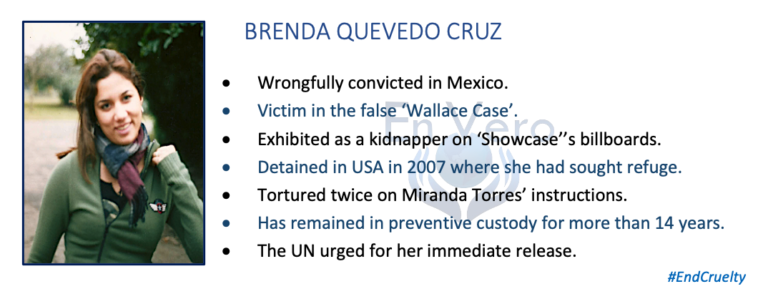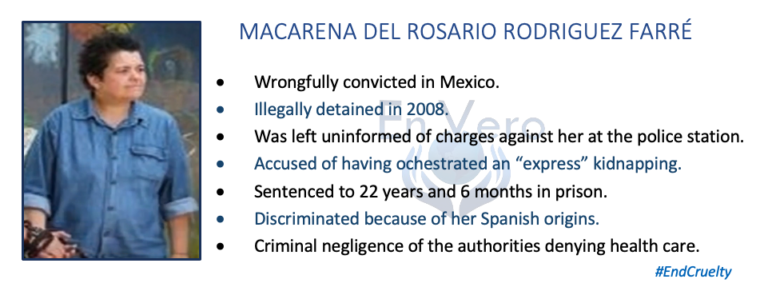
Source: ACDV Editorial – opinion (original version in Spanish)
Author: Michèle Mouafo
November 5, 2014
Translation: J.B. for CART / ACDV
At least once in our life, we have all experienced this immense feeling of helplessness and frustration for an act we did not commit, but we were charged with. A situation in which no matter how much we claim our innocence to whoever wants to listen, it always falls on deaf ears. A feeling that is so much more painful when the charges are serious.
This type of intrigue is well known and repeated in movies plots: a man unjustly accused of a crime he has not committed tries to prove his innocence. Inevitably, he attracts our attention and sympathy because of the remarkable feeling of injustice described above and with which we can identify ourselves: one is outraged at those responsible for the injustice and moved by the courage of the protagonist. However, the fiction ends when one leaves the theatre or turns off the TV.
The story of Alfonso Martín del Campo Dodd is not the figment of the boundless imagination of a talented writer who makes a living by jarring the sensitive fibers of the popular masses. It is not a lie or fiction, but pure reality. At age 27, he was charged with the premeditated murder of his sister and brother-in-law, perpetrated during a night that will remain engraved forever in his memory.
Martín del Campo’s version of the events is as follows: in the middle of the night the shrill cries of her sister crying for help woke him up and he went to help her out. By the bedroom door he found two masked men who, before hitting him, called him by his nickname, Chacho. He remembers that the men took him by force to a car and locked him up in the trunk, where they abandoned him and left him for dead, following a road accident. He managed to free himself with difficulty and approached the first police officers that he met to tell them what had just happened. Martín was sure of the fate of his sister and his brother-in-law.
The police went with him to the vehicle of the accident, where they found a bloody knife. They then took him to the crime scene where other police cars and ambulances were waiting. A young man from the neighbourhood told him about the murder. In a state of shock, Martín del Campo was taken to the police station, where they led him to the basement and questioned him. Four times, he repeated his version of the facts without nobody taking notes or recording his statement.
What follows is chilling. A police officer began insulting him and beating him. “Tell us how you did it, he told him. How did you kill them?” Then, by mutual agreement, the group of agents began beating him. Before they continued with the beating, they stripped him naked. At the end of it, they presented him with a written statement, in which Martín would acknowledge his guilt and they forced him to sign it. Faced with his denial, they went to get a plastic bag. After they suffocated him, and fearing death Martín ended up signing the document without reading it, to the great satisfaction of his torturers.
In 1993, Martín del Campo was sentenced to 50 years in prison for murder, a conviction that was based on the confession extracted from him that night. Fifty years of imprisonment. Ironically, this figure almost corresponds to the number of years of existence of the fundamental principles enshrined in the modern democratic system through the Universal Charter of Human Rights (1948).
The officer in charge of the investigation, named Galván, wrote that Martín del Campo was extremely drunk that night and that he would have killed his sister and his brother-in-law, because he was angry with him, due to a car repair bill for a total of 70 pesos. Nothing confirmed this version of events: an unimaginable reason, blood samples taken the same night showed that Martín del Campo was not drunk. However, Galván’s theory prevailed, despite the statement by the officer himself who acknowledged before the Court that he used illegal methods —such as torture— to obtain the confession.
However, the investigators did not lack clues to solve the case. The most elementary reflex when looking for a murderer is to wonder what the reasons are and who benefits from the crime. Gerardio Zamudio Aldada was brother-in-law and partner of the detainee. In a report on the file, it is explicitly mentioned that the Zamudio family inherited all of Gerardio and the company’s assets. By killing Martín del Campo’s sister and blaming him for it, it was guaranteed that all property of the deceased would go to the family. The authorities ignored the simple observation of this fact.
The fate of a man’s life relied on an investigation that was poorly and very quickly carried out and in confessions extracted by force.
Many other aspects of this file are also inexcusable. The parents of the detainee had to leave everything aside to deal with their jailed son. As if losing a daughter already weren’t a sufficiently enough family tragedy… For the serious violations committed against his most basic rights, Martín del Campo was refused compensation, under the pretext that he did not have enough evidence to incriminate Galvan… As if the confession were enough in one case but not in another.
The rule of law, foundation of our modern societies, is a doctrine that is based on equity. The greater principle of the rule of law is universality: every person, whatever his condition, any entity, any organization are subject to it. What is its purpose?: to avoid any form of arbitrariness and to proceed with total impartiality. Universality of of the rule of law: in theory.
In reading the story of Alfonso Martín del Campo Dodd, I am flooded with different feelings, among others: indignation, anger, contempt, shock, frustration, sadness… but what predominates is the total feeling of injustice. Relief is a luxury reserved to those for whom this kind of intrigue evolves in parallel with reality. To those who can afford not to think about the issue when they leave the theatre or turn off the TV.




